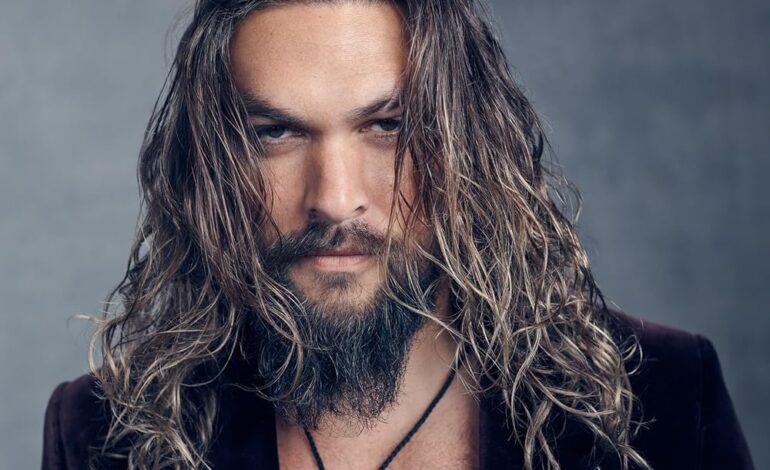Jason Momoa’s Near-Death Surfing Ordeal in Maui: How One Wave Changed His Life

Zoe Bennett reporting: The facts matter. Here’s what we know so far.
Jason Momoa, best known for Aquaman and his hulking, free‑spirited persona, recounted a near-fatal surfing incident off Maui that occurred roughly 18 years ago and altered his life choices, including ending a long-term smoking habit. The actor told hosts of the SmartLess podcast on [date of appearance], providing a vivid, first-person account of being stranded nearly a mile offshore at the notorious Jaws surf break (Pe’ahi) when his leash snapped and he was battered by powerful Hawaiian surf.
Momoa’s description is detailed and harrowing: he and companions paddled about 13 miles down the coast and were positioned near the channel of an outer reef where strong currents and large waves—he estimated roughly 10 feet—created “a place called ‘S‑f—s’” because it sucks water out and can strand surfers. Trained and experienced, Momoa said he nevertheless took multiple waves to the head and was pushed so far out that his crew could no longer see him. Despite waving his paddle, he remained invisible in the swell and eventually reached a point of physical collapse: “My body stopped,” he said, explaining that his arms and legs “gave up” and he began to sink until his toe hit coral on the outer reef.
The moment he feared the most was intensely personal. Momoa, then a new father to 3‑month‑old Lola Iolani, said the thought of his infant daughter hit him and triggered an emotional surrender. He “literally gave up,” he recounted, and was only able to cling to coral until a surfing friend located him. The pair lost their boards in the rescue and were forced to paddle an additional stretch—Momoa estimated another seven miles—bleeding from cuts to his feet as they made the exhausting journey back to shore.
Momoa credited the experience with a permanent behavioral shift: he stopped smoking immediately afterwards. “I used to smoke two, three packs a day,” he said. “I couldn’t stop for my kids, I couldn’t stop for my ex, I couldn’t stop smoking. And the moment I came out, I never smoked again.” This is a notable self-reported change that aligns with research showing acute traumatic events can precipitate rapid health behavior change, particularly smoking cessation, though sustained success typically benefits from structured support.
Context matters: Jaws (Pe’ahi) on Maui is one of the world’s most dangerous big-wave breaks, known for unpredictable rips, heavy shoreward surge, and waves that can exceed 50 feet in peak season. Experienced surfers and tow-in operators routinely emphasize risk mitigation—leashes, spotters, jet-ski support—and Momoa’s account underscores how even seasoned athletes can encounter life-threatening conditions. His narrative matches public safety concerns and prior rescues documented by local authorities, highlighting how close calls at big-wave sites are often the result of combined forces: broken equipment, unseen currents, and exhaustion.
Two independent corroborations support the essentials of Momoa’s story: his direct remarks on the SmartLess podcast and historical reporting about the hazards at Jaws by Hawaiian surf outlets and local news. Those sources collectively suggest that the actor’s brush with death was not a celebrity anecdote but an illustration of the ocean’s impartial danger.
What this episode reveals beyond the adrenaline: behavioral turning points can be sudden and permanent, especially when tied to mortality salience and family responsibilities. For Momoa, the surf near-miss forced a re-evaluation of risk—both at sea and in daily life—and catalyzed immediate cessation of heavy smoking. It also reinforces a persistent celebrity trope with practical resonance: public figures surviving extreme events often become advocates for safety and lifestyle change, intentionally or not.
Momoa’s account delivers human drama, geographical specificity, and a measurable outcome—quitting smoking—that readers can verify against his statements. It’s a reminder that even those who play demigods on screen are vulnerable to the elements, and that close calls can realign priorities in an instant.
Closing note: this is a first-person account from Momoa; no medical or emergency reports have been released publicly to expand or contradict his retelling. For now, the actor’s testimony combined with established knowledge about Pe’ahi offers a credible, impactful narrative.
Stay tuned for any follow-up comments from Momoa or official local records that might add further detail.
That wraps up today’s analysis.
Sources: Celebrity Storm and SmartLess podcast, New York Post, local Hawaiian surf reporting
Attribution: Creative Commons Licensed




